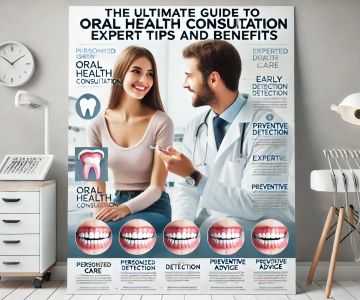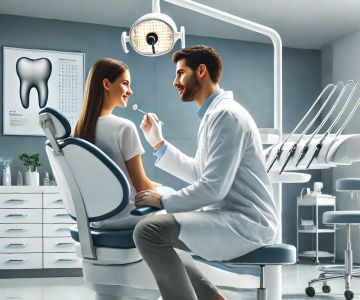Can a Dentist Check for Oral Cancer? Understanding the Importance of Regular Dental Exams
When it comes to oral health, regular visits to the dentist are essential for maintaining good hygiene and preventing potential issues. But did you know that your dentist plays a crucial role in screening for oral cancer as well? As alarming as the term "cancer" may sound, early detection of oral cancer can significantly improve the chances of effective treatment and recovery. In this article, I will walk you through how dentists check for oral cancer, why it’s important, and what you can expect during your routine dental check-up.
1. What is Oral Cancer?
Oral cancer refers to any cancer that develops in the tissues of the mouth, including the lips, gums, tongue, cheeks, and the roof or floor of the mouth. It can also involve the throat (oropharynx). Symptoms of oral cancer may include persistent mouth sores, difficulty swallowing, or changes in speech. Early-stage oral cancer often presents no pain, which is why it can go unnoticed without a professional examination.
2. The Role of Dentists in Detecting Oral Cancer
One of the most significant advantages of regular dental visits is that dentists are trained to spot the early signs of oral cancer. During a routine dental exam, the dentist will conduct a thorough examination of the oral cavity to look for any abnormal tissue changes that may indicate a potential problem.
The process generally involves:
- Visual Inspection: The dentist will closely inspect your lips, gums, cheeks, tongue, and the roof and floor of your mouth for any unusual signs, such as lesions, white or red patches, or sores that don’t heal.
- Palpation: The dentist may also gently feel your neck and jaw area for lumps or swollen lymph nodes that could indicate cancerous growths.
- Screening Tools: In some cases, your dentist may use special screening devices or techniques such as fluorescence visualization or oral cancer screening tests that help detect abnormal tissue even before it becomes visible to the naked eye.
3. Why Regular Dental Check-Ups are Important
According to the American Dental Association (ADA), oral cancer screenings should be performed regularly during dental check-ups, especially for individuals who are at higher risk. This includes people who smoke, consume alcohol heavily, or have a family history of cancer. However, anyone can develop oral cancer, so it’s essential to have an exam as part of your regular dental visit, typically every six months.
The best thing about having a dentist perform these screenings is that they can detect abnormalities early. Since oral cancer often progresses slowly, early detection can lead to better treatment outcomes, including less invasive treatments and higher survival rates.
4. What Happens if Oral Cancer is Detected?
If the dentist finds something suspicious, they may refer you to a specialist, such as an oral surgeon or an oncologist, for further testing and diagnosis. This could involve a biopsy, where a small sample of the tissue is removed and examined under a microscope to determine if cancerous cells are present.
While the news of a cancer diagnosis can be overwhelming, early detection means that treatment can start right away, significantly improving your chances of a full recovery. If the biopsy results are negative, you can be assured that there is no cancer, but the dentist may still recommend follow-up visits to monitor the area over time.
5. Common Risk Factors for Oral Cancer
Understanding the risk factors for oral cancer can help you take steps to reduce your chances of developing it. Some of the most common risk factors include:
- Tobacco use: Smoking or chewing tobacco significantly increases your risk of oral cancer.
- Excessive alcohol consumption: Drinking alcohol regularly increases the risk, especially when combined with tobacco use.
- Human papillomavirus (HPV): Certain strains of HPV are linked to oral cancer, especially in the oropharynx.
- Age and gender: Men over the age of 50 are at higher risk for oral cancer.
6. How to Prevent Oral Cancer
While some factors like age and genetics cannot be controlled, there are several lifestyle changes you can make to reduce your risk of oral cancer:
- Quit smoking or using tobacco products.
- Limit alcohol consumption.
- Protect your lips from the sun by using lip balm with SPF.
- Maintain good oral hygiene and see your dentist regularly.
- Eat a balanced diet rich in fruits and vegetables, which may help reduce your cancer risk.
7. The Importance of Early Detection
Early detection of oral cancer can save lives. The majority of oral cancers are treatable when detected early, so scheduling regular dental visits is one of the best ways to ensure that any potential issues are caught before they develop into something more serious.
As a frequent visitor to my dentist’s office, I have come to understand the importance of not only maintaining good oral hygiene but also using these appointments to screen for potential health concerns like oral cancer. I encourage everyone to schedule regular dental check-ups and take advantage of the invaluable screening services that dentists offer.





 Westgate Dental Arts
Westgate Dental Arts Coventry Family Dental
Coventry Family Dental Familia Dental
Familia Dental Dr. Daniel S. Fife, DDS
Dr. Daniel S. Fife, DDS Dentistry At Suburban Square: Michael I. Wollock, DMD
Dentistry At Suburban Square: Michael I. Wollock, DMD Comfort Care Dental
Comfort Care Dental The Importance of Oral Health Education During Pregnancy for a Healthy Pregnancy
The Importance of Oral Health Education During Pregnancy for a Healthy Pregnancy Why Skipping Dental Checkups Can Lead to Bigger Oral Health Problems
Why Skipping Dental Checkups Can Lead to Bigger Oral Health Problems Advantages of Porcelain Dental Restorations
Advantages of Porcelain Dental Restorations Best Tips for Brushing Your Teeth Properly for Healthy Gums: Essential Techniques for Oral Health
Best Tips for Brushing Your Teeth Properly for Healthy Gums: Essential Techniques for Oral Health How Can Diabetes Cause Tooth and Gum Problems? Preventing and Managing Oral Health Issues
How Can Diabetes Cause Tooth and Gum Problems? Preventing and Managing Oral Health Issues Healthy Habits for Promoting Good Oral Health and Hygiene: Tips for a Healthy Smile
Healthy Habits for Promoting Good Oral Health and Hygiene: Tips for a Healthy Smile